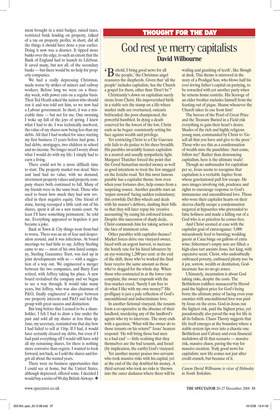God rest ye merry capitalists
David Wilbourne
‘Behold, I bring good news for all the people,’ the Christmas angel reassures the shepherds. Given that ‘all the people’ includes capitalists, has the Church a gospel for them, other than ‘Don’t be’?
Christianity’s down on capitalism surely stems from Christ. His impoverished birth in a stable sets the stamp on a life where market stalls are overturned, outcasts befriended, the poor championed, the powerful humbled. In dying a death reserved for the lowest of the low, Christ ends as he began: consistently setting his face against wealth and privilege.
Yet restricting Christ to a Che Guevara role fails to do justice to his sheer breadth. His parables invariably feature capitalists in a neutral and usually sympathetic light. Margaret Thatcher forced the point that the Good Samaritan needed money as well as good intentions to treat the Jew mugged on the Jericho road. Yet this most famous parable has a capitalist theme: how even when your fortunes dive, help comes from a surprising source. Another parable stars an ‘unjust steward’ facing sudden redundancy; this erstwhile Del Boy wheels and deals with his master’s debtors, slashing their bills so that they will later repay his ‘creative accounting’ by easing his enforced leisure. Despite this succession of shady deals, Christ commends him for taking action in the face of imminent crisis.
Other parables with capitalist themes? Market forces drive one vineyard owner, faced with an urgent harvest, to increase the hourly rate for his hired labourers by an eye-watering 1,200 per cent: at the end of the shift, those who’ve worked the final hour receive the same amount as those who’ve slogged for the whole day. When those who contracted in at the lower rate complain, the owner responds with the free-market creed, ‘Surely I am free to do what I like with my own money?’ His profligacy is just a pale reflection of God’s unconditional and indiscriminate love.
In another fictional vineyard, the tenants form a co-operative in the absence of their landlord, murdering any of the landlord’s agents who try to intervene. The story ends with a question, ‘What will the owner do to those tenants on his return?’ Jesus’ hearers respond: ‘He will bring those bad men to a bad end’ — little realising that they themselves are the bad tenants, and Israel (by implication, the earth) God’s vineyard.
Yet another master praises two servants who took massive risks with his capital, yet at the end of the day doubled his money. A third servant who took no risks is ‘thrown into the outer darkness where there will be wailing and gnashing of teeth’, like Slough at dusk. This theme is mirrored in the story of a Prodigal Son, who blows half his ever-loving father’s capital on partying, to be rewarded with yet another party when he returns home contrite. His Scrooge of an elder brother excludes himself from the feasting out of pique. Shame whenever the Church takes its cue from him!
The heroes of the Pearl of Great Price and the Treasure Buried in a Field risk everything to gain their heart’s desire. Shades of the rich and highly religious young man, commanded by Christ to ‘Go sell all that you have and give to the poor.’ Those who see this as a condemnation of wealth miss the punchline: ‘And come, follow me!’ Rather than denouncing capitalism, here is the ultimate trade!
Though no ambassador for capitalism per se, Jesus seems to recognise that capitalism is a veritable Jupiter from whose gravitational pull few escape. He uses images involving risk, prudence and rights to encourage response to God’s immanence and unconditional love. Those who wore their capitalist hearts on their sleeves chiefly escape a condemnation targeted at hypocrites who pretended to false holiness and made a killing out of a God who is so priceless he comes free.
And Christ seemed at ease with the capitalist goal of extravagance: 5,000 miraculously feed to bursting; wedding guests at Cana binge on gallons of extra wine; fishermen’s empty nets are filled; a high-class tart anoints Jesus, her king, with expensive scent. Christ, who undoubtedly embraced poverty, embraced plenty too: be it joy, sorrow, wealth or destitution, Godincarnate has no no-go zones.
Ultimately, incarnation is about God taking risks, despite the costs. The Bethlehem toddlers massacred by Herod paid the highest price for God’s being born; the ultimate price of facing even your enemies with unconditional love was paid by Jesus on the cross. God-in-Jesus ran the highest risk, paid the highest price, yet paradoxically also paved the way for life in all its fullness. Chaos Theory suggests that life itself emerges at the boundary where a stable system tips over into a chaotic one. Bethlehem and Calvary and even financial meltdown all fit that scenario — massive risk, massive chaos, paving the way for massive creation. Truly good news for capitalists: new life comes not just after credit crunch, but because of it.






















































































































 Previous page
Previous page